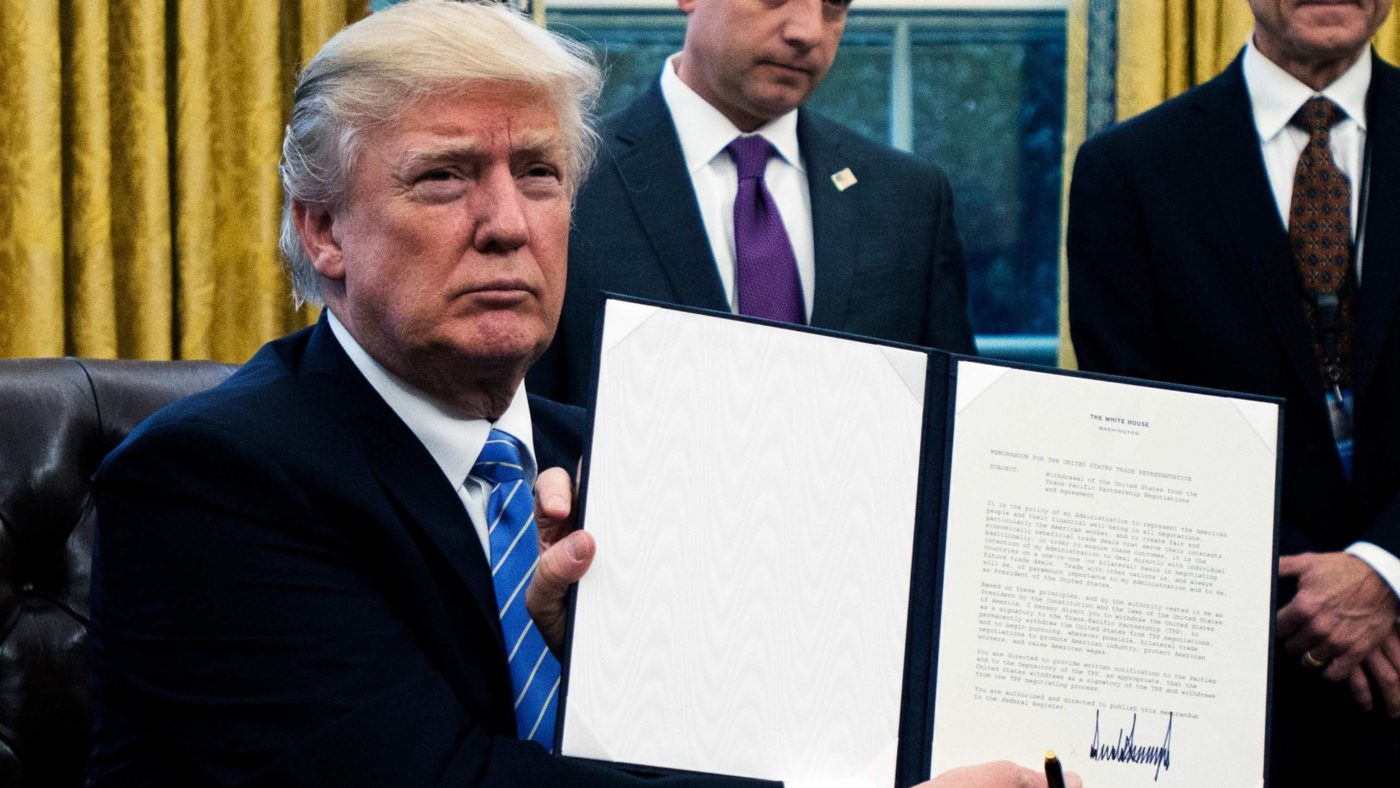People were stunned when the Trump administration unilaterally bailed on the Trans-Pacific Partnership (TPP) trade treaty in January 2017. It seemed like a deadly blow to an agreement that would have lowered tariffs among 12 nations.
What did this move portend for the cause of free trade? Some despaired that it would signal a new trend toward protectionism, not only for the US but the world. There is a certain nationalist myopia in this judgment. Americans are inclined to believe that if Washington is against something, that something won’t happen at all.
What many people did not expect is that the treaty would go ahead in any case, without US participation.
The remaining nations forged ahead and reached a new agreement on November 11. The US finds itself excluded, which could cause real problems for American exporters to countries like Malaysia, Japan, Australia, and Peru. Canada’s lobster industry, for example, will soon have better access to the foreign marketplace than the US’s, which could cause serious problems for an entire industry.
But here is what is most striking. The new draft of the agreement excludes the entire section on Intellectual Property – the most annoying and anti-freedom part of the deal that had huge prominence in all the treaty drafts.
As it turns out, it was the US influence that explained why this treaty included the section to begin with. The section seriously compromised the entire agreement, as Stephan Kinsella explains. It turned what was supposed to be about free trade into a tool for intensifying the hegemonic control of the US pharmaceutical, movie, and publishing industries, expanding patent enforcement, copyright terms, and making much-needed reform that more difficult.
In other words, in this area of policy, precisely due to US participation, the treaty would have enhanced state power, not reduced it, as a free trade treaty should.
Writes Kinsella:
“The TPP would only marginally improve free trade, but would export to other countries stronger copyright and patent standards, which would increase the costs these monopoly privilege systems impose on economies, reduce Internet and artistic freedom, increase the prices of pharmaceuticals, and reduce innovation.”
After the US pulled out, groups interested in more freedom of movement for goods and services stepped up the pressure, without having to worry about the role of US regulators and industrial monopolists, who have long used these treaties to expand regulatory power.
The Electronic Frontier Foundation explained its role in the victory:
“Back in August, EFF wrote to the TPP ministers explaining why it would make no sense to include copyright term extension in the agreement, because literally none of the remaining parties to the TPP would benefit from doing so. The apparent decision of the eleven TPP countries to exclude not only the copyright provisions, but nearly the entire IP chapter from the agreement, more than vindicates this. As we have explained at length elsewhere, IP simply isn’t an appropriate topic to be dealt with in trade negotiations, where issues such as the length of copyright and bans on circumventing DRM are traded off with totally unrelated issues like dairy quotas and sources of yarn used in garment manufacturing.”
As an American, it is gratifying to see world trade becoming freer. Though the treaty is still imperfect, it does raise hope for more trade and therefore higher living standards. What is downright humiliating for Americans is that the treaty became better only after the US withdrew from it. Here we have an excellent test case of the role of the US in pushing global trade. It turns out that the US influence has been for the negative.
The rest of the world is starting to catch on. There will be no turning back from economic globalisation. It will happen whether the US approves or not.
And that fact leaves American free traders in a very awkward position. Some of us supported US participation in the TPP while others opposed it, depending entirely on one’s judgement regarding how much compromise is considered acceptable. Similarly, the withdrawal from the treaty by the Trump administration was greeted with mixed feelings. There is some bad and some good that comes from that.
The last expectation would be that the treaty would come to more closely approximate a free-trade ideal in the absence of US participation. That is good for the world. It’s not good for US participation in the next stage of world economic integration.
The idea of “going it alone” is not inherently contrary to free markets. If US trade negotiators were genuinely interested in lower barriers of all sorts (and that has to include not only tariffs and quotas but also the thousands of other regulatory barriers), they could go country by country and broaden markets. Even better, so long as we are dreaming: the US could pursue free trade unilaterally.
Sadly, the policy ethos in the United States is turning ever more toward a mercantilist approach. In time, we will discover that the main victims here will not be bad foreigners who are cheating us but American consumers and producers who will face fewer opportunities to live better lives. The rest of the world will move forward.
This article was originally published on FEE.org. Read the original article.


